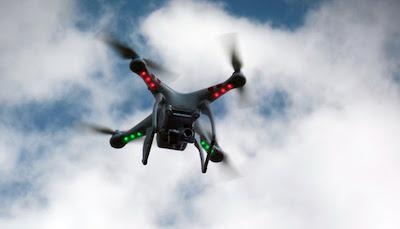Would Will Help Pave The Way For Expanded And More Complex Operations, Association Says
The Association for Unmanned Vehicle Systems International (AUVSI) has submitted its formal comments on the Federal Aviation Administration’s (FAA) Notice of Proposed Rulemaking (NPRM) for Remote Identification of Unmanned Aircraft Systems (UAS). In its comments, AUVSI emphasized the importance of remote ID for expanded UAS operations and encouraged the FAA to explore ways to incentivize early, voluntary compliance with remote ID prior to the implementation of the final rule.

“Remote ID standards are necessary to enable expanded operations such as package delivery which will have significant economic and societal benefits,” said Brian Wynne (pictured), president and CEO of AUVSI. “The FAA should encourage voluntary compliance by giving preferential treatment to operators who comply early, before a final rule is implemented. Voluntary compliance will help ease the transition and allow us to reap the many benefits of remote ID sooner.”
AUVSI’s comments offer ways the FAA can incentivize compliance even before the final rule is implemented, including prioritizing compliant operators when processing applications for those wishing to fly drones either subject to waiver under Part 107.205 or Part 135 exemption for on-demand operations; increasing airspace access for voluntarily compliant operators; or offering financial rebates for manufacturers or reimbursement for the knowledge exam taken by aspiring commercial drone pilots that have successfully completed a recognized practical training course that adheres to the remote ID standards.
While the FAA is adjudicating comments on the remote ID rule, AUVSI is urging the FAA to also proceed concurrently with other rulemakings, such as those for flights over people and beyond visual line of sight operations. This dual track approach will avoid unnecessary delays in achieving expanded operations once the remote ID rule is finalized and implemented.

“The FAA should not only move forward rapidly with rulemakings on expanded operations, it should prioritize permitting expanded operations for operators that are in compliance with the final remote ID rule, rather than waiting until the compliance timeline expires,” AUVSI wrote in its comments. “Not only would this incentivize rapid implementation among operators, but it would allow the public to reap the benefits of UAS operations sooner rather than later.”
In addition, AUVSI recommends the FAA allow for flexibility in the technological approaches taken by drone operators and adopt performance-based rules that comply with international standards and do not include prescriptive technology requirements. This recommendation is consistent with those published in 2017 by the FAA’s remote ID Aviation Rulemaking Committee (ARC), of which AUVSI was a member, and the ASTM F3411-19 Standard Specification for Remote ID and Tracking, which was published in February.
AUVSI wrote in its comments that “[i]t may well be that for particular requirements there is a limited means of complying, and that certain requirements will have the practical effect of dictating current technology choices. However, that type of true performance-based requirement is far different from simply imposing a regulatory mandate that operators employ a particular type of technology, because it allows technology to morph and grow, making the overall regulatory objective clear and ascertainable.”
AUVSI also suggests the FAA consider the importance of operator privacy and security and to be mindful of how remote ID will harmonize with similar standards around the world.
(Source: AUVSI news release)
 Airborne 05.10.24: Icon Auction, Drunk MedEvac Pilot, Bell ALFA
Airborne 05.10.24: Icon Auction, Drunk MedEvac Pilot, Bell ALFA ANN's Daily Aero-Term (05.13.24): ILS PRM Approach
ANN's Daily Aero-Term (05.13.24): ILS PRM Approach ANN's Daily Aero-Linx (05.13.24)
ANN's Daily Aero-Linx (05.13.24) Airborne-NextGen 05.07.24: AI-Piloted F-16, AgEagle, 1st 2 WorldView Sats
Airborne-NextGen 05.07.24: AI-Piloted F-16, AgEagle, 1st 2 WorldView Sats Airborne 05.08.24: Denali Update, Dad-Daughter Gyro, Lake SAIB
Airborne 05.08.24: Denali Update, Dad-Daughter Gyro, Lake SAIB




